
Neuromorphic Computing and Engineering
Scope & Guideline
Connecting Minds to Shape the Future of Computing
Introduction
Aims and Scopes
- Neuromorphic Hardware Development:
Research on the design and implementation of hardware systems that mimic the neural structure and function of biological brains, including memristors, synaptic devices, and photonic systems. - Algorithms and Architectures for Neuromorphic Systems:
Exploration of novel algorithms, architectures, and methodologies that leverage neuromorphic principles for efficient processing, learning, and information representation. - Integration of Biological Principles:
Studies that draw inspiration from biological neural networks and cognitive processes, aiming to replicate or model their functionalities in artificial systems. - Event-Driven and Spiking Neural Networks:
Focus on computational models that utilize event-driven processing and spiking neural networks, emphasizing real-time learning and adaptability. - Applications in Robotics and AI:
Application of neuromorphic computing principles to enhance robotic systems, artificial intelligence, and edge computing, promoting intelligent and autonomous behaviors. - Energy-Efficient Computing Solutions:
Research targeting the development of low-power, energy-efficient neuromorphic systems suitable for various applications, particularly in mobile and embedded environments.
Trending and Emerging
- Hybrid Neuromorphic Systems:
There is a growing interest in hybrid systems that combine various neuromorphic technologies, such as integrating optical and electronic components, to enhance computational capabilities and efficiency. - Bioinspired Learning Mechanisms:
Emerging research focuses on bioinspired learning mechanisms, including spiking neural networks that mimic biological learning processes, highlighting their potential for real-time adaptation and efficiency. - 2D Materials and Emerging Devices:
The use of two-dimensional materials in neuromorphic devices is becoming increasingly prominent, showcasing their unique properties for creating advanced synaptic and neuronal elements. - Event-Driven Processing Techniques:
Event-driven processing methodologies are trending, emphasizing real-time data processing and low-power operation, which aligns with the needs of modern AI applications. - Applications in Edge Computing and IoT:
Research is increasingly directed towards the application of neuromorphic computing in edge devices and IoT systems, focusing on efficient processing capabilities for on-device AI solutions. - Exploration of Non-Volatile Memory Technologies:
There is heightened interest in non-volatile memory technologies for neuromorphic computing, as they offer potential for enhanced data retention and energy efficiency in neural architectures.
Declining or Waning
- Traditional Neural Network Architectures:
The exploration of classical neural network architectures has decreased as researchers pivot towards more biologically inspired and neuromorphic models that offer enhanced efficiency and adaptability. - Purely Software-Based Neural Implementations:
There is a noticeable decline in research focused solely on software-based neural network implementations without hardware integration, as the field increasingly emphasizes the interplay between hardware and software. - Single-Domain Device Research:
Studies that focus exclusively on individual device types without considering integrated systems or multi-device architectures are waning, as the trend shifts towards holistic approaches that encompass complex interactions. - Generic Machine Learning Techniques:
Research employing generic machine learning techniques without a focus on neuromorphic principles is becoming less common, reflecting a shift in interest towards specialized methods that align with neuromorphic computing paradigms. - Theoretical Studies without Practical Application:
There is a decline in purely theoretical explorations of neuromorphic concepts without tangible experimental validation or practical application, as the field moves towards more applied research.
Similar Journals

Science China-Information Sciences
Leading the Way in Global Information Science Discoveries.Science China-Information Sciences is a prestigious academic journal published by SCIENCE PRESS, dedicated to advancing knowledge in the field of information sciences and computer science. Established in China, the journal has gained a remarkable reputation, with a 2023 category quartile ranking of Q1 in Computer Science (miscellaneous) and an impressive Scopus rank of #16 out of 232 in General Computer Science, positioning it within the 93rd percentile. The journal embraces a broad spectrum of topics, from theoretical frameworks to practical applications, providing a platform for researchers, professionals, and students to disseminate their findings and engage with the latest advancements in the field. With open access options available, Science China-Information Sciences ensures that innovative research is accessible to a global audience, fostering collaboration and interdisciplinary dialogue. The journal not only reflects the evolving landscape of information sciences but also plays a pivotal role in shaping future research directions.

Jordan Journal of Electrical Engineering
Bridging Knowledge Gaps for Future InnovatorsJordan Journal of Electrical Engineering, published by TAFILA TECHNICAL UNIVERSITY (TTU) in Jordan, serves as a critical platform for disseminating groundbreaking research in the fields of electrical engineering, energy systems, and related disciplines. With an ISSN of 2409-9600 and an E-ISSN of 2409-9619, the journal is committed to promoting advancements in energy engineering, biomedical applications, control systems, and signal processing among others. Despite its recent establishment in 2023, it has been indexed in multiple categories within Scopus, receiving rankings that reflect its emerging role in the academic community. Researchers and professionals are encouraged to contribute and access cutting-edge articles through open access options, ensuring that knowledge is readily available to all interested parties. As the journal continues to grow, it aims to bridge gaps in knowledge and stimulate dialogue, thereby supporting innovation and practical applications in the engineering sector.
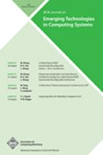
ACM Journal on Emerging Technologies in Computing Systems
Shaping Tomorrow's Technology Landscape TodayACM Journal on Emerging Technologies in Computing Systems, published by the Association for Computing Machinery, stands as a premier platform dedicated to the exploration and discussion of avant-garde advancements in computing systems. With an ISSN of 1550-4832 and an E-ISSN of 1550-4840, this journal has achieved notable recognition, holding a 2023 Q2 ranking in key fields such as Electrical and Electronic Engineering, Hardware and Architecture, Nanoscience and Nanotechnology, and Software. Spanning from 2005 to 2024, it provides a critical forum for researchers, professionals, and students alike to disseminate innovative research and applications that shape the future of technology. Although currently not open access, the journal's commitment to high-quality, peer-reviewed content ensures its relevance and impact, as reflected in its competitive Scopus ranks across various disciplines. Engage with groundbreaking research that propels the frontiers of computational systems in this dynamic academic journal.

JOURNAL OF SUPERCOMPUTING
Illuminating the Future of Computer ScienceJOURNAL OF SUPERCOMPUTING is a premier academic journal published by SPRINGER, situated in the Netherlands, that has made significant contributions to the fields of computer science, particularly in hardware and architecture, information systems, software, and theoretical computer science. With a robust publication history spanning from 1987 to 2024, this journal has cultivated a strong reputation, evidenced by its Category Quartiles ranking in the Q2 category across multiple relevant domains in 2023. The journal's Scopus rankings further underscore its influence, boasting a 78th percentile in mathematics and theoretical computer science, revealing the high quality of research disseminated within its pages. As vital discourse unfolds in the realm of supercomputing—where innovative techniques and technologies rapidly evolve—this journal serves as a crucial platform for researchers, professionals, and students to explore cutting-edge studies and build upon the foundations of knowledge in this dynamic field.
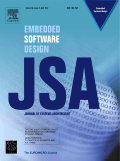
JOURNAL OF SYSTEMS ARCHITECTURE
Pioneering Discoveries in Computer SystemsJOURNAL OF SYSTEMS ARCHITECTURE is a prestigious academic journal published by ELSEVIER, based in the Netherlands, that has established itself as a leading platform for research in the fields of Hardware and Architecture and Software. With an impressive impact factor and ranked in the Q1 category for both computer science sectors, this journal is recognized for its high-quality contributions, evidenced by its Scopus ranking of #32 in Hardware and Architecture and #74 in Software, placing it in the top percentiles of its field. The journal spans a wide range of topics central to systems architecture, focusing on innovative research that advances the understanding of computer systems and promotes future developments. Researchers, professionals, and students alike will find invaluable insights and emerging trends that address the challenges and opportunities within the rapidly evolving field of systems design and architecture. Spanning from 1996 to 2024, the JOURNAL OF SYSTEMS ARCHITECTURE continues to be a vital resource for those seeking to stay at the forefront of technology and research.

NEW GENERATION COMPUTING
Exploring the Future of Technology and NetworksNEW GENERATION COMPUTING is a prominent academic journal published by SPRINGER, specializing in the dynamic fields of Computer Networks, Hardware and Architecture, Software Engineering, and Theoretical Computer Science. With a commitment to disseminating high-quality research since its inception in 1983 and extending its coverage to 2024, this journal occupies a vital role in advancing knowledge and innovation within these critical domains. Holding prestigious Q2 rankings in Computer Networks and Communications, Hardware and Architecture, and Software, as well as a Q3 ranking in Theoretical Computer Science for 2023, NEW GENERATION COMPUTING attracts significant contributions from scholars and professionals around the globe. Researchers will find its rigorous peer-review process ensures the publication of impactful studies, while students gain access to cutting-edge research that shapes contemporary computing practices. Though it does not offer open access, the journal remains an invaluable resource in the academic community, fostering collaboration and dialogue among experts aiming to push the boundaries of technology.
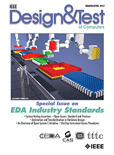
IEEE Design & Test
Transforming Challenges into Solutions in EngineeringIEEE Design & Test is a leading academic journal published by the IEEE-INST ELECTRICAL ELECTRONICS ENGINEERS INC, dedicated to advancing the fields of Electrical and Electronic Engineering, Hardware and Architecture, and Software. With an ISSN of 2168-2356 and an E-ISSN of 2168-2364, the journal spans from 2013 to 2024, offering valuable insights and peer-reviewed research that addresses critical challenges in the design, verification, and testing of electronic systems. Recognized for its quality, the journal holds a Q2 designation in Electrical and Electronic Engineering and ranks within the top quartiles of its category, making it a notable resource for professionals and scholars alike. Its Scopus rankings, particularly a rank of #354 in Electrical and Electronic Engineering, underscores its significance and relevance in the rapidly evolving technological landscape. Although not currently open access, the journal remains committed to disseminating innovative research that shapes the future of technology, ensuring that researchers and practitioners stay at the forefront of their disciplines. IEEE Design & Test serves as an essential platform for exchanging ideas, fostering collaboration, and driving advancements in engineering and computer science.
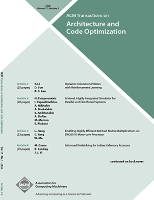
ACM Transactions on Architecture and Code Optimization
Shaping the Evolution of Architecture and CodeACM Transactions on Architecture and Code Optimization, published by the Association for Computing Machinery (ACM), serves as a premier journal in the fields of architecture, hardware, and software optimization. With an ISSN of 1544-3566 and E-ISSN of 1544-3973, this journal provides a platform for innovative research and discussion from 2004 to 2024, reflecting its commitment to the evolving landscape of computer science. Holding a Q2 ranking in key categories such as Hardware and Architecture, Information Systems, and Software, it stands out in its field, catering to a broad audience of researchers, professionals, and students alike. While the journal does not currently offer open access, subscribers can benefit from an array of valuable insights into cutting-edge techniques for optimizing code and architectural designs. Its rigorous peer-review process ensures that only high-quality, impactful research is published, making it an essential resource for those seeking to advance their knowledge and practice in these vital areas of computing.
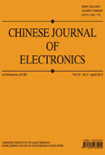
CHINESE JOURNAL OF ELECTRONICS
Connecting Scholars with Cutting-edge Engineering DiscoveriesThe CHINESE JOURNAL OF ELECTRONICS is a distinguished peer-reviewed publication in the fields of electrical and electronic engineering and applied mathematics, published by the reputable IEEE-Institute of Electrical and Electronics Engineers Inc. Based in the United States, this journal has been a significant platform for sharing innovative research since its inception in 1996. With a commendable impact factor, it is ranked Q3 in both applied mathematics and electrical engineering categories, reflecting its relevance and quality within the academic community. The journal aims to disseminate high-quality research, foster interdisciplinary approaches, and provide a forum for discussions on advancements and applications in electronics and associated fields. Although it currently does not offer open access, the CHINESE JOURNAL OF ELECTRONICS remains a key resource for researchers, professionals, and students seeking to stay at the forefront of technological developments. Its Scopus rankings—170th in applied mathematics and 365th in electrical engineering—highlight its credibility and importance in advancing knowledge and innovation.

International Journal of Semantic Computing
Unveiling the Future of Computational LinguisticsThe International Journal of Semantic Computing is a premier scholarly publication focused on the intersection of artificial intelligence, computer networks, and linguistics, published by World Scientific Publishing Co PTE Ltd. Since its inception in 2007, this journal has strived to advance the field of semantic computing by promoting innovative research and interdisciplinary collaboration among professionals and academics. With a diverse scope that spans across various categories including Artificial Intelligence, Information Systems, and Linguistics, it boasts commendable rankings, particularly in the fields of Linguistics (77th Percentile) and Linguistics and Language (Rank #259/1167). The journal caters to a broad audience by offering critical insights and cutting-edge studies, thereby contributing significantly to knowledge enhancement in semantic technologies and computational linguistics. Although it does not offer open access options, its rigorous peer-review process ensures the publication of high-quality research that is invaluable for both researchers and students seeking to deepen their understanding in these rapidly evolving areas.